- Boat
- Articles
- About
- Tehani-li Logs
- 2004
- Uligan Maldives
- Man, Oh Man, Oman
- Eritrea: The Nicest Place You’ve Never Heard Of
- Cruising Notes: Oman to Eritrea – From Pirates to Cappucinos
- Old Testament Sudan
- Egypt: Legend, Myth and Reality
- Thoughts on Cruising the Red Sea
- Greece: Civilization Again
- Montenegro
- Malta
- Sardinia, Italy
- Barcelona, Spain
- 2003
- 2002
- 2001
- 2004
- Contact
Let Slip the Lines
We left Seattle by sea and we arrived in French Polynesia. In fact, we are now anchored in a beautiful atoll in the deserted Tuamotus as I write this. Looking out the porthole my gaze drifts across the clear blue water lapping at the white coral sand beach to the tall coconut trees gently swaying in the warm breeze on this uninhabited tropical island. There was a leaving and there was an arriving and a lot happened between those two points in the arc of time. Sailing to a faraway land is a romantic thing to do but it is not just for the wonderful destinations we do these things but also for the journey that happens to you in the middle. (At least for me this is the case. Ariel, on the other hand, hates “the journey in the middle” and would rather just focus on the wonderful destinations).
This trip was no different. April Fool’s Day was the intended date of departure for our foolish adventure and we almost made it. March was a mad scramble to disentangle from the comfortable tentacles of suburbia and all the “stuff” we had accumulated during our short three years there. We sold both cars. We sold most of our furniture. We rented out our house. After leaving our last car at the dealer’s I hopped in a taxi and was dropped off at Shilshole Marina in Seattle where I had left the family on the boat. We were now car-less. Free.
The boat is crammed full of six months’ worth of food, gear and toilet paper. There is no place to sit down without moving 50 pounds of boxes and bags of things. It will take us three full days to find enough places on board to stow everything away.
That cold March night, while dreaming of our imminent departure to warm sunny climes, our heater quietly passed away. Late March at 47 degrees north is not a warm and happy time to be outside. It can be warm and it can be happy but as I quickly learned, you have to be warm to be happy. Without our heater – which also produces hot water – we were decidedly unhappy. Yes, we were heading to the tropics and we would definitely not need a heater there but to get to that promised land we had to go through some cold times. As it turned out, the weather for our first two weeks on passage required either a heater or a mutiny.
The first thing that morning after a nice shave in ice water, I was on the phone to the technician at Sure Marine, the heater/propane guys a mile and half down the road. He gave me some ideas and diagnostic tests to perform and it all came back blank. The next step was to remove the heater head, a metal cylinder with tubes and wires that weighs 30 pounds and bring it in to their shop. I know Sure Marine is a mile and half away because being car-less and “free” I had to stuff that thing into a backpack and march down the road arriving when they opened the next day.
After running the recalcitrant unit for four hours on their workbench the good fellows at Sure were sure that I had a faulty controller. This is a black box the size of Berlitz phrasebook filled with magic circuits. Another hike back to the shop and after $600 floated out of my wallet and into theirs I had a new controller with new magic circuits and everything worked fine again.
Spring weather in the North Pacific is tricky. Some would say treacherous. The treacherous camp would be the ones who got caught out. I say tricky because we avoided the worst of it. At that time of year storms race up from the southwest dumping snow and rain dispersed with liberal amounts of wind and wave. We did not want to catch one of those in the face as we needed to head SSW to get to French Poly. But our lease was up at Shilshole and it was time to leave. I had asked for a one day extension and was expected to be charged very high transient rates for that night. However, again and again, despite being a government operation, the good people at Shilshole Marina continued to outstrip all my expectations and just prorated one month’s lease for a night. It was cheap and was kind of them to do so. (“Cheap” is something to which those without a steady income are magnetically attracted).
Great Adventure Born from Little Steps
The next day at dawn, after a nice shave in hot water, I donned my offshore gear and rousted the first mate from bed. After years of saving and planning this was the day we cast off. The excitement aboard was palpable; I had a spring in my step and a sparkle in my eye. At 0600 everyone else was groggy with sleep. As I leap off the boat down to the dock and begin untying our lines my hands tremble with excitement. It took years and years of planning and sacrifice endured just to get to this point. The engine is puttering away happily and the crew are bundled up and sitting in the cockpit. No more time for reflection; I throw the last line on deck and jump aboard.
We slipped our lines and took advantage of the southerly wind sailed north wing on wing between four and six knots to the top of Puget Sound, the beautiful area we had sailed on so many times before preparing for this trip. The afternoon saw us tie up at Point Hudson Marina, one of our favorite spots. There we waited a couple of days in the rain and wind which had closed in around us for a break in the weather before heading out. The few people we met always asked the same questions:
“Where you headed?”
“French Polynesia.” This usually resulted in a puzzled look so I would add, “Tahiti.” That worked a charm.
“Tahiti! Wow. Where have you come from?”
“Uh, Seattle,” which being just 30 miles away certainly made our claims of south seas “reachability” rather tenuous.
“Uh-huh.”
This was rather irritating and I was determined to leave soon. But we will never just go because I want to or because of snarky locals. The weather gods must allow it. We waited another day, got our break and bolted for the blue horizon.
We were able to leisurely sail down the Juan de Fuca Strait to the North Pacific and at dawn on Easter Sunday, when the Easter Bunny is busy poisoning good children around the world with industrial chocolate eggs, we rounded Cape Flattery under sail at 7 knots. This was a glorious entrance to the North Pacific. Glory is a fleeting thing and ours was not to last long either; the wind promptly disappeared and we were now faced with the leftover slop of messy four to six foot waves from the last storm, recently departed and certainly not mourned. Off the western coast of Washington we wallowed around most of one day with the mast arcing back and forth like a metronome waiting for the wind to come back. But the wind went shopping at Macy’s or like a mischievous schoolboy playing hooky did whatever it felt like which was just not turn up.
“Legs furiously pumping
Their stiff green gallop….” – The Doors
We were approaching the Horse Latitudes and “true sailing was dead,” as Jim Morrison, chief of the dead poets society, might put it. They are so called because ships often had to resort to pushing their horses and gear overboard in desperate attempts to lighten the ship to gain any forward motion. The lack of wind but abundance of ocean swell rolls Asmara Sky from side to side quite violently. The sails hang limply – they are up just in case there is a puff – but they fill with a bang like cannon shot as the boat rolls one way and then collapse as it rolls back and then fill again with the next roll producing another ear splitting boom. Not only has detailed scientific research shown this will drive sailors crazy in under three minutes, it damages the sails and rig as well. I think for a moment, we have horses to throw overboard but these are stuffed animals with names like “Pinky” and “Flutter Shy” that the girls probably will not relinquish readily. Times like this call for the motor.
On came the engine, down came my hopes. We had 4,000 miles to go and needed to conserve fuel. Our range under power, depending on conditions, is just over a thousand miles. I had four extra jerry cans filled with precious diesel but these only gave us another 20 gallons. We also needed fuel for the heater and the diesel generator which charges the batteries and runs the watermaker.
The Yanmar Yammers On
We motored that day and all night and all the next day and all the next night. The fuel gauge showed me we were running lower and lower on this unsustainable resource. We moved further and further offshore until when rather inconveniently 250 miles offshore and four days of motoring later I rubbed my eyes and could just make out the writing on the wall: Go to San Francisco You Idiot. We altered course and motored toward San Francisco to fuel up. Our fridge was not working either by that time so I figured we could get that fixed as well.
But that was still a couple of days away and I had plenty of time to think. The girls spent the first three days in the cockpit. Asmara was sick, her mother was sick and little Adriana Sky just slept. After that the offspring recovered and got their sea legs – Ariel not quite yet. She remains basically comatose in the cockpit, refusing to go down below because the motion there will make her sick again. I try and be extra considerate, avoiding subjects such as greasy pork chops or spinach floating in buttermilk. I know the girls are better because they are singing their favorite song “Doe a Deer,” (again and again and again). When they are seasick I sit there unmoved by their suffering on the outside but inside I do wish it were otherwise.
Ariel is incapable of movement. I have to do everything on board: sail, navigate, keep watch, cook, clean, feed and wash the children, entertain them and put them to bed. I sleep two to three hours a night and none during the day. Somebody has to be alert and I am still a pretty good “lert.” While exhausted I hope each day that Ariel feels better. It takes her four grueling days of suffering before she slowly becomes herself again. I am exhausted by that point and not only warmly welcome her recovery but keenly appreciate her help.
As can be seen from the pictures, it is cold out on North Pacific Ocean in early April. We are all wearing every stitch of clothing we can under our offshore gear. The cockpit is protected from the icy wind by a strong dodger and bimini and if we worry about dozing off during our watch we can just stick our face out to the side and catch an arctic blast which nicely freezes the surface of the cheek and instantly jerks the mind back to attention.
During the long hours of the passage the mind wanders more to extraneous subjects. Like a librarian of old thumbing through a drawer full of index cards looking for an interesting book, I reminisce about odd things. I remember European friends and how they all enjoy sharing funny stories about “stupid Americans” they have seen on television or on the internet. While I appreciate the humor I don’t think they realize America is a huge country with a plethora of stupid people. There are a lot of smart ones too but clearly we don’t put them in front of the camera.
Having never sailed to San Fran before I was not sure where to take the boat. We had electronic charts of the area and I had providentially taken a Google Earth snapshot of the bay and stored it on the computer before we left, just in case. I remember exactly 20 years ago flying out to the Bay area for a friend’s wedding and had taken an afternoon to rent a small sailboat and go sailing. That was Sausalito which became our next stop.
Ironically, the missing wind filled in as we approached San Francisco three days later and I gratefully turned off “the donkey” and raised our sails. It was late afternoon and we enjoyed a beam reach sailing right down the middle of the channel toward the famed Golden Gate Bridge. The sun showered us in golden light as we approached the Golden Gate, our entrance to the “Golden State.” (California is the “Golden State.” It says so on all the license plates. This is because it requires a lot of gold to live there. And some madness. Yes, that definitely helps).
We saw a seal pop up to look at us and the girls were in the cockpit watching as the big red bridge drew closer and closer. We could make out cars on it going back and forth. Dolphins appeared as we got closer and with the setting sun they escorted us under the bridge as we rode the wind in, sailing at seven knots. What a fantastic moment and a welcome treat after a six-day, 800 mile mostly windless passage.
A pleasant week was spent at Schoonmaker Marina in Sausalito. Laundry was washed, food was eaten, fuel tanks filled and a fridge was (temporarily) rid of its gremlins. Asmara’s school friend from Hong Kong, Arianna had relocated to the area and we had a happy reunion with the Kopp family on the beach as the children played kids stuff and the adults chatted adult stuff.
We made a trip into the big smoke of San Francisco and wandered around like goofy tourists with the girls for a day. I take a picture of the family in front of what I consider the best restaurant I have eaten at in the entire United States. Tadich Grill must be doing something right since they have been in business for over 150 years. Needless to say, we don’t eat there as I rather expect their pricey fare tastes better on an expense account. I coincidentally run into a former client from Hong Kong and we go to his office to catch up. We have known each other 15 years. He spends his days and nights tirelessly working to make rich people richer and he is very good at it. I spend mine on a boat fixing things and wish I were good at it. It is a strange world.
We’re Not Superstitious
Good news on the weather: the northerlies have kicked in. In fact, they were now blowing 30 knots with 18 foot seas. We needed north wind to head south but Ariel for some reason visibly blanched at the idea of 18 foot seas. So we waited and it was here, folks, that I made a cardinal error. We waited a few days and left Sausalito bound for the Marquesas on a Friday. No sane sailor to be found (sober) in any port around the world welcomes a Friday departure. It is bad luck and just plain foolishness. We were extra careful not to leave Washington on a Friday. The reasons for this reach back into the hallowed mists of time and while nobody can quite explain why – it is something you just don’t fool with. This fool thought better. I figured we were still ON our trip to the South Pacific and Sausalito was only a stop so we were not really leaving ON a Friday but just CONTINUING. I was to learn a harsh lesson in the difference between the letter of the law and the spirit of the same. There are no $400 an hour lawyers to argue your case with King Neptune. Our bad luck would come in spades in two short weeks’ time.
But Maybe We Should Be
Our entrance into San Francisco Bay was sunny but our departure that morning occurred in the more traditional thick fog that city is famous for. The fog horns sounded all around us and we found the shipping channel using our chart plotter (computer screen) and radar. As we passed under the bridge we could see the cars zipping back and forth full of people grimly heading to work and gazed up at the tall red towers which disappeared into the fluffy white fog bank. BROOOOOOOOOOOH! The fog horn blasted as we approached. Asmara squinted in pain and instantly clasped both hands to her small ears. We discovered there is a LOUD fog horn on the side of the bridge and one positioned right in the middle facing downward, the volume of which is turned high up enough to assault the hairy ears of the now nearly deaf members of The Who. The next blast was so loud the whole boat shook.
We survived the continued auditory assault and motored for two hours southwest until we detected some north wind. I raised the sails and cut the engine and we sailed nonstop almost all the way to the equator. The sky was overcast and land had disappeared behind us, swallowed up by the wide open horizon. We didn’t expect to see terra firma again for another three weeks. My logbook entries for that day in part read:
April 17
1700: N 37.18 W 122.53
Wind NW 15-20 knots Rocketing along under sail at 7.5 knots. 45.5 miles out from San Francisco. O/cast with NW swell. Girls are all “adjusting” in the cockpit. Nobody sick….
1730: Ariel and Asmara both sick.
0000: N 36.36 W 123.21
Toaster flies off counter and dents floor.
Like running a gauntlet with angry Lakota Sioux on both sides wearing blue cloaks with white hats, waves four to six feet high shoved and pushed us around, frequently washing up onto the decks with a fearsome roar. Spray hit the dodger and splashed cold salty water into the cockpit every now and then just to keep us on our toes. Each morning I would pick off a half dozen or more of what we called “sail jellies,” or little velela which get washed onto the decks with the angry waves. Velela are small purple members of the jellyfish family that consist of a translucent light purplish sack which rests just under the surface of the water. They propel themselves by manipulating a sail about the size of a potato chip which sticks out of the water (hence the Latin name “vela,” or “sail”). Much like us, they can move with the wind or apparently even at an angle to the wind depending on how the little sail is held. We saw tens of millions of velela all down the coast off Washington and Oregon and they were still collecting in vast groups acres wide off California. What they talk about God only knows but they seem to enjoy each other’s company as we only saw them in huge flocks, or swarms, or swathes.
Twenty-four hours out of San Francisco when we were 150 miles offshore of Morro Bay, the water began to warm up. The temperature had maintained a steady 51 degrees F all the way down the coast (48 degrees in Puget Sound) and now it shot up to 55 degrees. This is what we had been waiting for. We were still “mummified” in all our clothing and offshore gear, along with wool hats and ski gloves to keep warm but we finally felt like we were making progress to see a change in the water temp. Later that evening I noted in the logbook we were now exactly 250 miles west of Ojai, California where I began growing up.
The water continued to warm up a degree or two each day. A few days later we were able to shed the wool hats and gloves. A few days after that off came the long johns and wool socks. I was trolling a rubber squid behind us with my fishing rod and something big hit it. My log notes: “Lure gone. Fish safe.”
That day was sunny and the color of the water was deep cerulean blue. It was a profound blue that was mesmerizing to peer into and all of us sat in the cockpit just peering. The wind was from behind and we were sailing with the mainsail up and a poled out genoa, the famous “wing on wing” rig. We had done 750 miles in the last five days and “only” had 2,267 more miles to go. Things for the good ship Asmara Sky were looking up.
The next day the sea state changed again. If “rolliness” is not a word it should be for that undesirable condition made our lives miserable. The boat violently rolled from gunwale to gunwale. We did our best at stowing away, tying up and battening down everything which could move, shift, squeak or fly in those conditions so the boat itself, our number one priority, was alright. But it was still as noisy as a Friday night at Grand Central Station and when the icy blue waves picked up our 27 ton boat and threw her down on her side the sound of plates, cups, silverware, pots and what have you crashing together was incredible. The girls sleep in a bunk bed configuration (pipe berths) with lee cloths rigged so they won’t get flung out no matter how rough it gets. Asmara and Adriana both thankfully always manage 12 hours of blissful uninterrupted sleep, clutching a favorite stuffed animal.
Their parents, of course, had more of a challenge to sleep and since somebody always has to be on watch at all times, the most we could try and sleep was a couple of hours at a time while the other person was at the helm. Despite the unpleasantly rough motion both Ariel and I were able to grab some shuteye in these conditions just because by now we were so damn tired.
April 23
0500: N 24.54 W 128.21
“Things still crashing around in the cupboards with each roll and it makes me think now I could sleep through earthquakes, rocket attacks and full blown riots.”
Cooking in these conditions sees me braced with legs far apart and leaning forward over the stove down in the stuffy galley. My hand grabs the counter fiddles every time I sense the boat rolling away in the other direction. I stir with one hand, grab the counter with the other and with legs spread both knees are pressed hard into the wooden doors of the cabinets below to brace myself. Washing dishes requires similar acrobatic ability and they must be put away immediately. There is no rest for the wicked when it comes to dishes in these conditions: it is either “dry” or “fly.” I wash with my bruised knees pressed hard into the wood, dry and put everything away. Nothing is left out on the counters and when all is “ship shape” I bounce back up the companionway stairs to the cooler air of the cockpit, wiping sweat from my brow and drinking in deep lungfuls of pure unpolluted air while I scan the horizon for any threatening ships that might mow us down.
We eat in the cockpit clutching a bowl each. There are no plates used on this part of the passage; everything is dumped into a bowl (nicely) and eaten carefully as the boat rolls its merry way south. Nobody wants to eat down below at the table in the salon while underway. It is too hot and the motion too uncomfortable for fine dining and complete digestion.
Barefoot in the Cockpit
We crossed into the tropics at 21.30 degrees north on April 24th, just over a thousand miles south of San Francisco. The water temperature was now a balmy 68 degrees – a full twenty degrees warmer than our home waters of Puget Sound. We were now wearing shorts and were barefoot in the cockpit! Yet while flannel shirts were still needed, the air began to feel “sultry.” We were definitely in the NE trades now as the wind blew from that direction consistently at 25 to 30 knots pushing us along up and over the back of every swell and we corkscrew and skitter our way down the face only to repeat the motion with the very next one. The waves slap our stern around as we ride over them as if to desiring us not to relax and constantly keep in mind out here who is boss. Coincidentally or not, that evening just before sunset we saw our first flying fish and our first tropicbird. And only 2,000 more miles to go….
“Got out of town on a boat goin’ to Southern islands
Sailing a reach before a followin’ sea
She was makin’ for the trades on the outside
And the downhill run to Papeete…” – Crosby, Stills and Nash
I kept scanning the skies at night for the Southern Cross, the constellation that dominates the minds of those who live in the Southern Hemisphere as the Big Dipper does ours up north. Actually, the Southern Cross is even more significant as it features prominently on the flags of both Australia and New Zealand while the Big Dipper, as far as I know, can only be found on the state flag of Alaska. The skies were still mainly overcast one thousand plus miles from San Francisco but slowly the clouds began to break up. That night I finally spy the pride of the southern hemisphere riding high over our bow which steadily cleaves through every wave as another mile washes by under our keel.
1356 miles out from land just after lunch we are visited by a beautiful pod of dolphins. These seemingly carefree animals love to play with boats and as soon as they sense a sailboat underway the rush to it, sometimes from all sides, to join in the fun of movement. They jump and splash and crisscross paths next to us, in front of us and under us wild with joy. It makes you realize we, who are constantly tripping, falling and backing cars into things, are truly the clumsy cousins of the animal kingdom. Nine days of passage-making and rough conditions with little sleep has Ariel and I well fatigued and we can only look on in wonder at the energy the dolphins display and enjoy the squeals of happiness from our two still bouncy little ones who point out each animal and rapidly narrate their antics. An hour later our dolphin friends depart as mysteriously as they arrived and life in the cockpit resumes its normal rhythm.
Unable to read much, Ariel comments, “I can only read for 15 minutes. My brain is mush!” Mine too acts like wet cereal and concentration is difficult. Our noon to noon run is only 138 miles, less than the 150 we had been averaging as if the boat too felt rather listless. We enjoy our own company and many conversations on various topics whiling away the time.
April 27th
Noon: N 14.45 W 129.23
Asmara: Daddy, where are we going to go after the tropics?
Me: I don’t know. Where do you want to go?
Asmara: Alaska!
Adriana: Me too!
Me: Yeah, me too. But Mommy doesn’t want to go.
Mommy shaking her head right now.
Adriana: But we need a cook!
Mommy: Hey!
Then our luck began to turn in the same direction we were sailing: south. It began with the watermaker overheating. This was bad news because without it we would not have water to drink, quite a necessary item on most transoceanic voyages. I had been careful to keep the water tank topped up so we had a full tank of water but still were looking at another two weeks to go. If I could not get the watermaker working again then all water would be for drinking only and all washing (dishes and personnel) would have to be in sea water.
April 28th
0000: N 13.36 W 129.21
We are 1,500 miles from land in any direction. Have not seen a ship or even a plane in five days or so. This must be one of the more remote places on earth. Watermaker pump overheating and shutting down. Worked on it in the afternoon and will again tomorrow morning. Not good being out here with no ability to make fresh water.
It is hot on board these days; 89 degrees down below in the salon. Asmara and Adriana stripped off to their panties in the afternoon. They played happily, hugging the aluminum mast inside the salon to keep cool, giggling the whole time. Afterward at dinner Asmara asked, “Mommy, why don’t you run around in your panties?”
The next day we are cruising along at 6.5 knots with poled-out jib. The refrigerator stops working at 2 AM. My comment in the log: Fun. Great. Oh, well.
We have now entered the feared ITCZ, the Intertropical Convergence Zone which hangs around the equator like an unwelcome thug outside a 7-11 and is notable for heat, humidity and battering squalls. We need to turn the engine on here and there as we lose the wind. I am now wearing shorts and a T-shirt and still sweating through every gritty pore. All of us feel the heat and stickiness as it is so different from the crisp Pacific Northwest to which we have become accustomed. I am still not sleeping well.
May 1
0600: N 06.02 W 129.32
I have been suffering severe sleep deprivation the last few days. Last night I finally slept a blissful uninterrupted three hours! I dreamed about a dinosaur on the loose with terrified people running away from him. But he moved very slowly and was too tired to chase anyone. People stopped running and commented, “What a lousy dinosaur.” Hmmm.
We have been fighting a counter current that reaches up to two knots the last couple of days which really retards our progress. But our dogged persistence has begun to pay off. We are now just 950 miles from the Marquesas and now that the last 1,000 mile barrier has been quashed morale begins to rise. The end, if not in sight, is literally a heck of a lot closer than it used to be.
May 3
1600: N 03.19 W 29.47
Asmara: Daddy, what’s your favorite word?
Me: Sleep.
Asmara: What’s your second favorite word?
Me: Food.
Crossing the Line
Finally, on May 4th at 0450 we cross the equator, just before sunrise at S 00.00 W 130.54. While it was dark our lonely way was illuminated by a beneficent full moon which took pity on us. We were also sailing at 5 knots and had only another 750 miles to our destination. We were now in the southern hemisphere.
“Crossing the line” under sail is loaded with significance and for countless centuries has required all first timers on board to undergo a strict pagan ceremony where they must appear before King Neptune, eat and drink something foul, shave their head and go for a swim. A good shot or two of the best booze on board is poured overboard as an offering to King Neptune. Once completed, the sailor becomes a “shellback” and a respected member of the sailing brotherhood. Depending on the crew and the ship, these ceremonies could be terrifying or a lot of fun. We opt for the more fun route.
Ariel and I have “crossed the line” under sail twice before in the Indian Ocean so we officiated as King Neptune and “Queen Ariel.” Now while we can probably all agree that there really is a King Neptune only little girls who watch the Disney movie “Ariel” over and over again would believe there is a “Queen Ariel.” But that is how we did it.
Two days later our generator died. This is the diesel-powered AC engine that charges our batteries and runs many things on board – including the watermaker. So now there was NO way to make water. I had a failed lift pump and despite my careful accumulation of spare parts in the years before we left, for some reason the words LIFT PUMP did not enter my walnut-sized brain. Without it the generator will not start.
May7th
12:30 S 06.18 W 136.45
Bereft of a working generator, watermaker and saddled with an impossibly power hungry and lazy fridge, we roll on. And on and on. I have to use the main engine now to charge the batteries which is inefficient and heats up the whole boat to 90 degrees or more. Turning it on when we are enjoying glorious trade wind conditions (steady cooling wind of 20 knots just aft of the beam with a nice regular swell) seems a sacrilege. The boat continues to sashay away soothingly at 7 to 8 knots with almost no effort on my part. Ariel revels in the tropical heat while my slowly browning girls continue to pine for Alaska!
It was true. We were now enjoying the southern hemisphere trade winds and great sailing conditions ushered us quickly along our way. Our noon to noon runs increased to 165 miles, 178 miles and then 182 miles.
I have been sleeping in the cockpit at night now while Ariel does her midnight to four am watch. This works well for both of us and I can slowly recharge my batteries, if not those onboard. Despite our trials and tribulations, the next evening we raise the Marquesas Islands on radar – right where they were supposed to be. We are too far off to see them and it is getting dark but the red and yellow smudge on the radar 48 miles ahead just off our port bow is our first intended landfall in Polynesia. I have to slow the boat down to five knots so we arrive at dawn and not before. It is an exciting time.
May 8th
Noon: S 07.52 W 138.43
Three weeks at sea as of today. If we make landfall tomorrow as planned then it will be 22 days from San Francisco to Nuku Hiva. Plus six days for Seattle to San Francisco. So for the last 35 days 28 have been spent at sea.
Our landfall was a moment mixed with equal parts excitement and relief when we sighted the rugged outline of Nuku Hiva at dawn. It always amazes me and I am still naturally suspicious when using GPS for navigation. We are on what many call the “featureless ocean” for weeks with no sight of land, no sign of land and no sight or sign of ship or airplane either. How do I know we are not just going in circles? You look out of the cockpit and dammit if it doesn’t all look the same. Obviously, the rising and setting sun helps. Keeping those celestial events on the same sides of the ship each day and at least I am certain our general direction is true. But to cross thousands of miles of open water and actually hit, dead on, a tiny island in the middle of that vast expanse is still quite amazing to me. I made sure to daily plot our noon position on a large scale paper chart of the N. Pacific Ocean and then the S. Pacific Ocean as we progressed. This gave me some concrete evidence and confidence that, yes, we were actually heading toward a real destination and would therefore likely make landfall.
But to have the first island in the group show up on our radar 40 plus miles out RIGHT where it should be and RIGHT at the moment it should appear is still, well sort of voodoo, pinpoint, bulls-eye, witch doctor navigation. Arthur C. Clarke once said, “Any technology sufficiently new is indistinguishable from magic.” Having used GPS for pelagic navigation for years I still see the magic.
The mysterious island of Nuku Hiva itself rose out of the inky darkness ahead of us capped in cloud as the sun crept higher in the sky behind. I was really hoping to sail under the looming cliffs at dawn, shitty family video camera in hand. Not to be. The swells bounced off the island cliffs creating a confused sea and the wind deserted me and my photographic fantasy. Cranking up the engine and a course change was called for.
I then went up to the mast to raise the French tricolor and the yellow quarantine flag, always a happy moment. To do so signals we are coming from afar, we are entering your country now for the first time and require clearance. There was enough breeze for the two flags to flutter a bit and they added a little splash of color to our tired, salt-encrusted craft.
As we motored (relatively) quietly under the southern part of the island and turned toward the large bay of Taiohae, our long awaited destination, a pod of muscular brown dolphins appeared and calmly swam beside the boat on both sides welcoming us in with the fluid grace common to wild animals and now absent in man. The sun rose higher and the light it cast danced upon the sparkling water. Our toes were tingling and all of us were smiling happily as we turned to slowly enter the magical bay of vegetation and vowel-heavy “Taiohae.”
The settlement, as it can hardly be called a town, is spread out along the water and into the valley that rises gently behind it. Houses can be seen peeking out on steep verdant hillsides from under banana or mango trees, between which spreads a rich carpet of grass that grows naturally with the frequent tropical rain. Smoke arose here and there from small fire as people burned leaves and coconuts and I inhaled its musky scent along with a lush vegetal fragrance from all the eager plant life which has claimed the island as its own since the day after the last volcanic eruption eons ago. Roosters crowed and I heard a car start. Taiohae actually smelled and sounded a little like Guatemala, I thought, remembering the happy times we spent there on another boat years ago.
The bay is the stage of a large volcanic amphitheater with green mountainous cliffs soaring straight up and surrounding the water on both sides in a timeless geologic embrace. There were about forty or so yachts already anchored there which is about forty more yachts than we had seen since leaving San Francisco three weeks ago. At the edge of the anchorage we quietly dropped our hook in the translucent waters with a loud splash, backed down on it hard to ensure a good set and then switched off the engine.
Silence.
French Polynesia.
3,173 nautical miles from San Francisco and 3,993 nautical miles from Seattle we are here. More smiles. Kisses for all the crew. We made it.

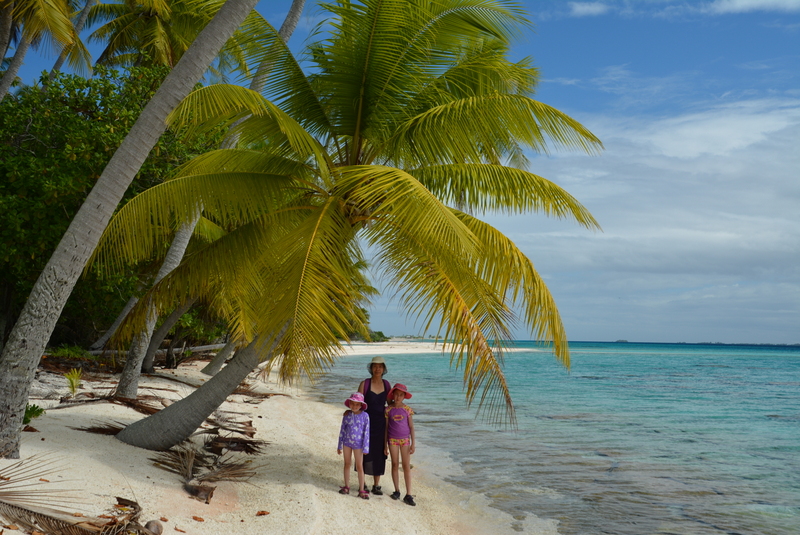
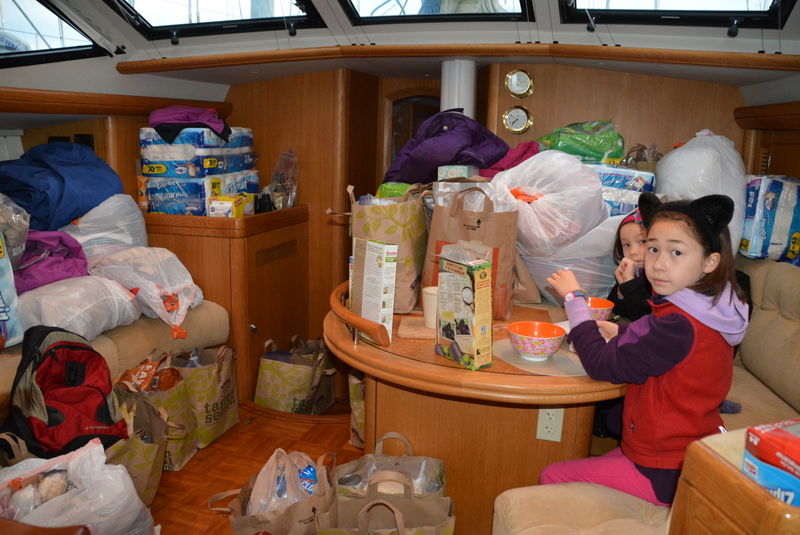
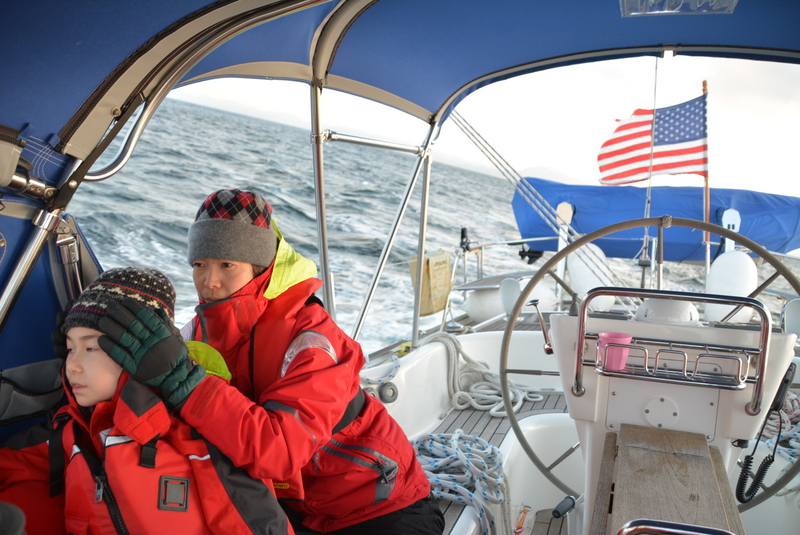
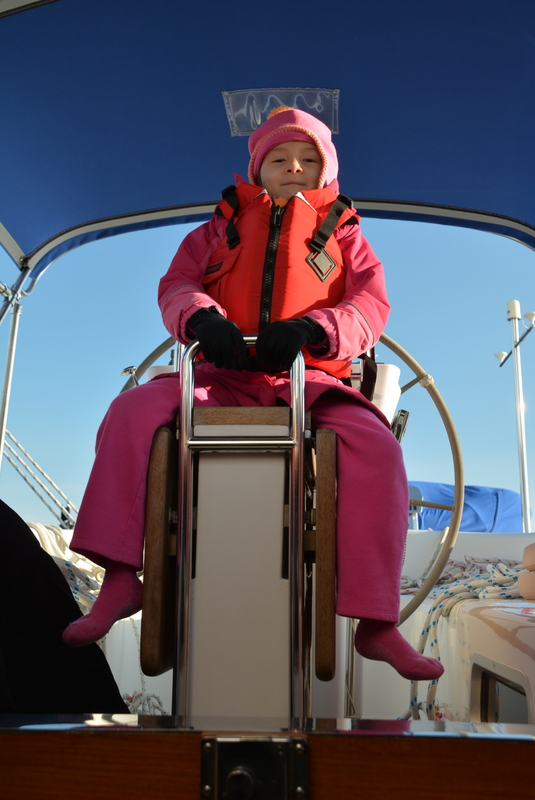
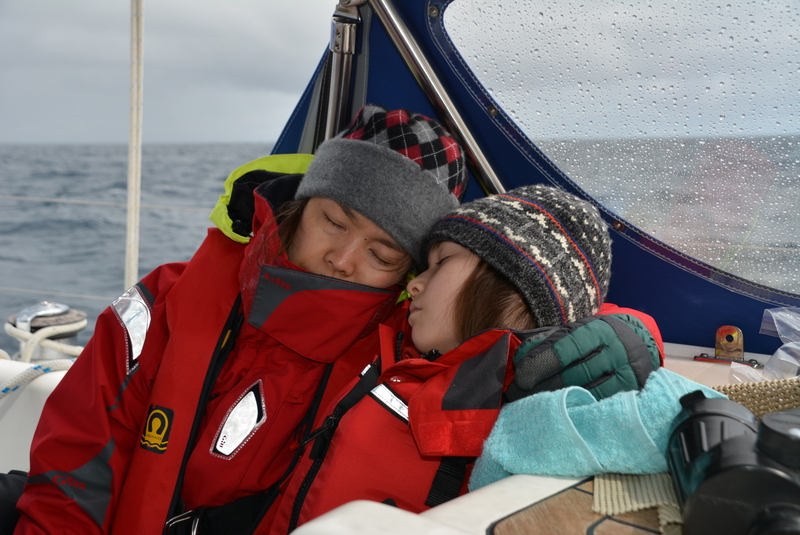
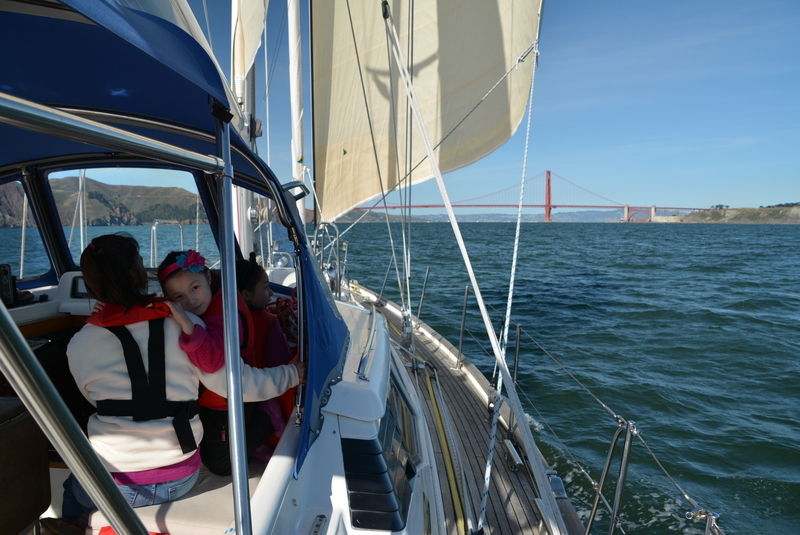
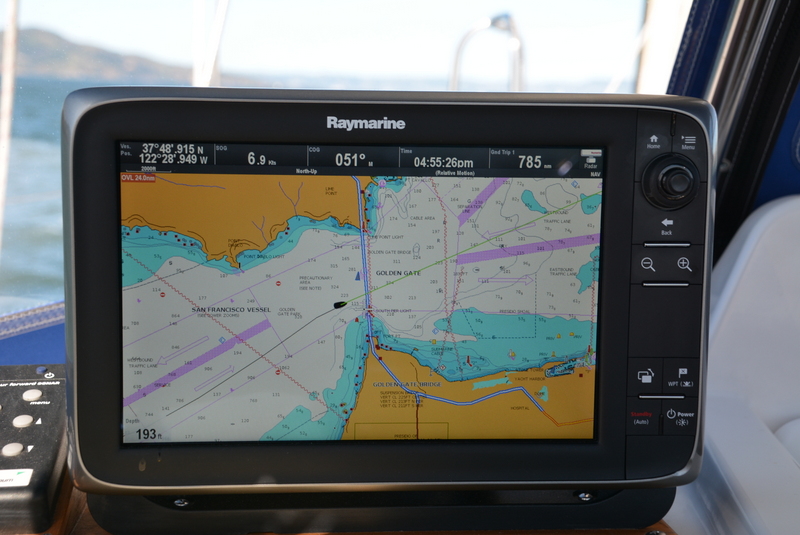
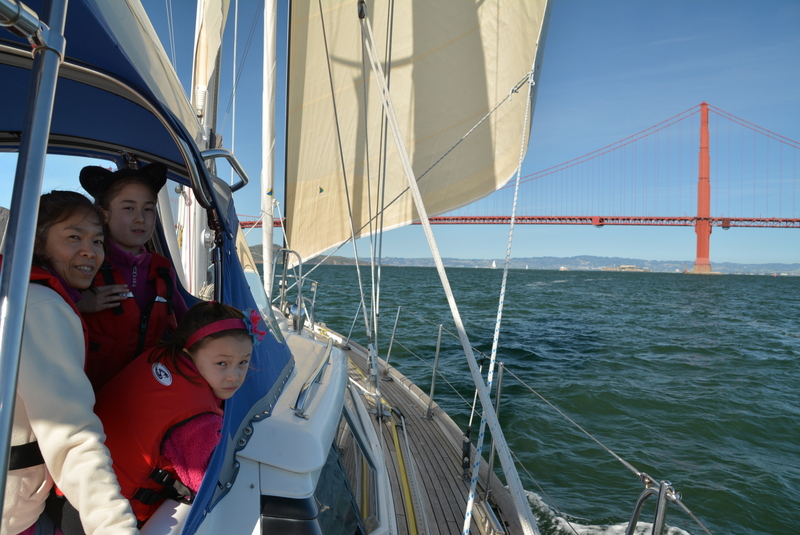
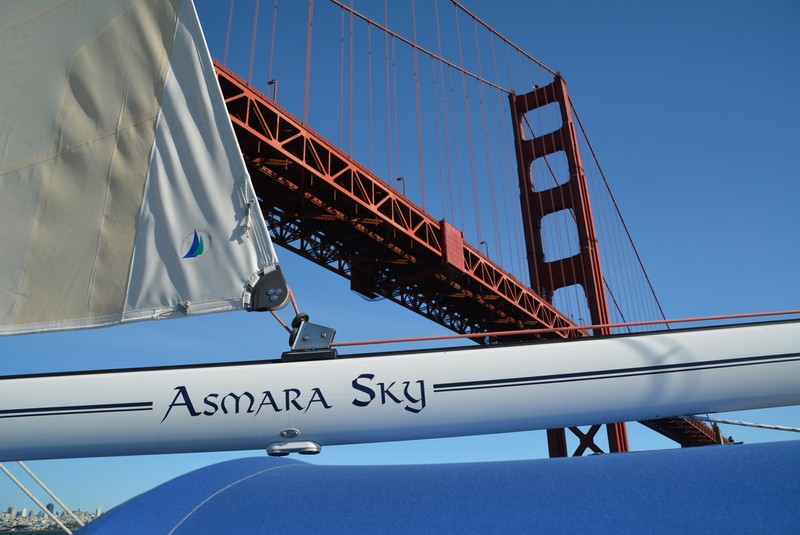

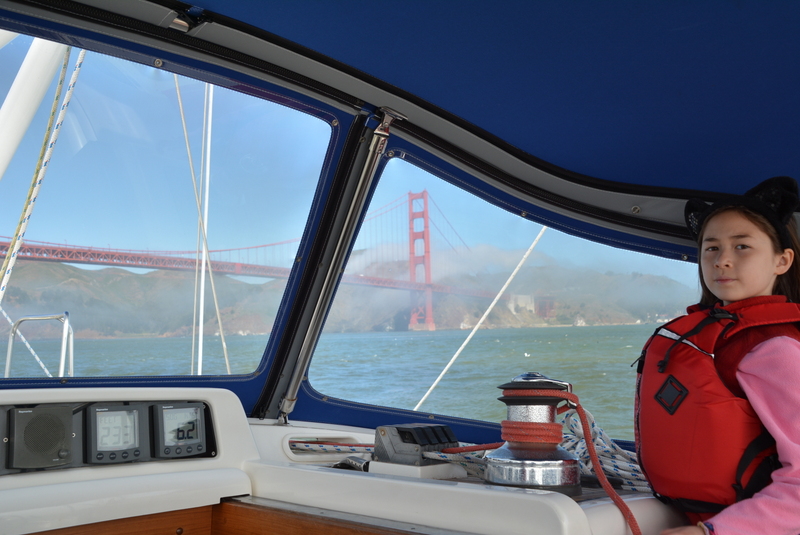
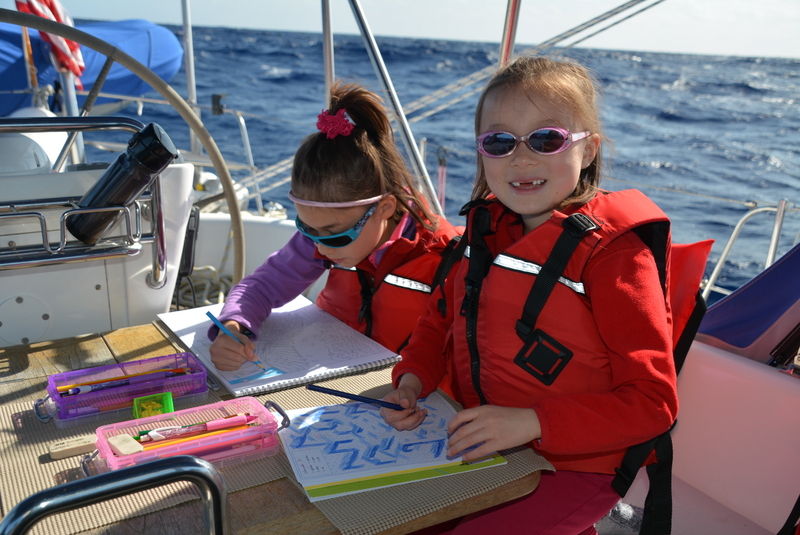
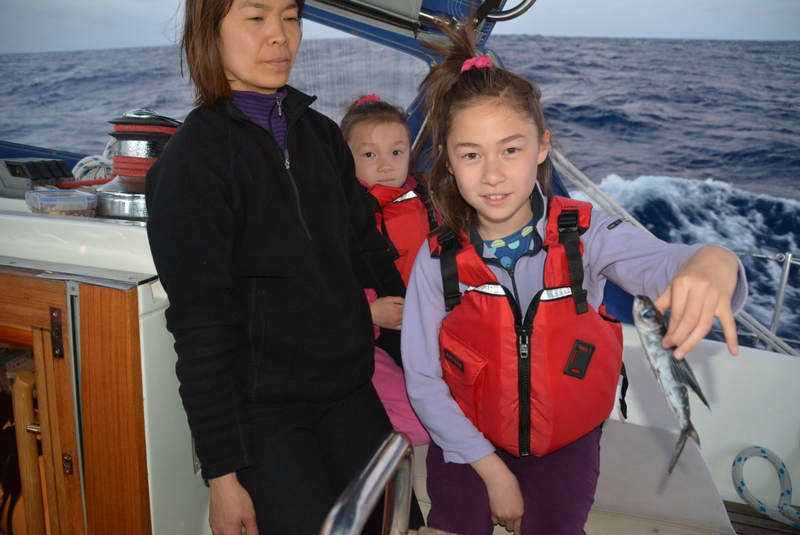
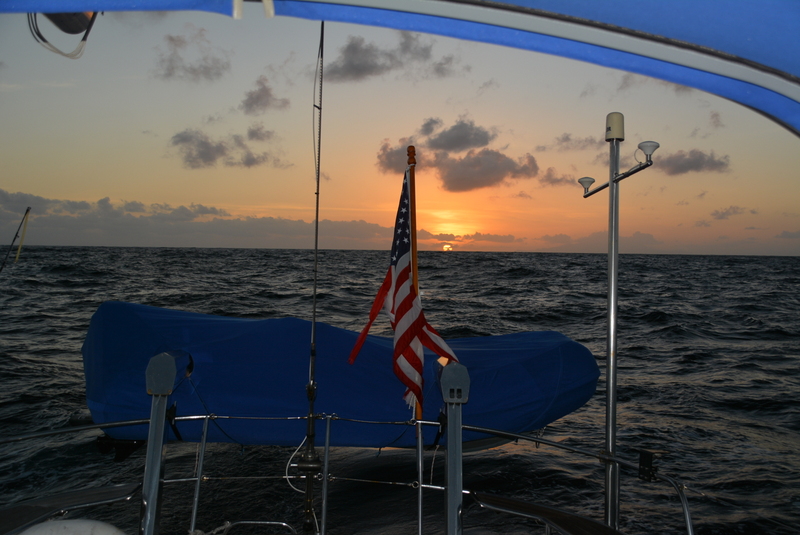
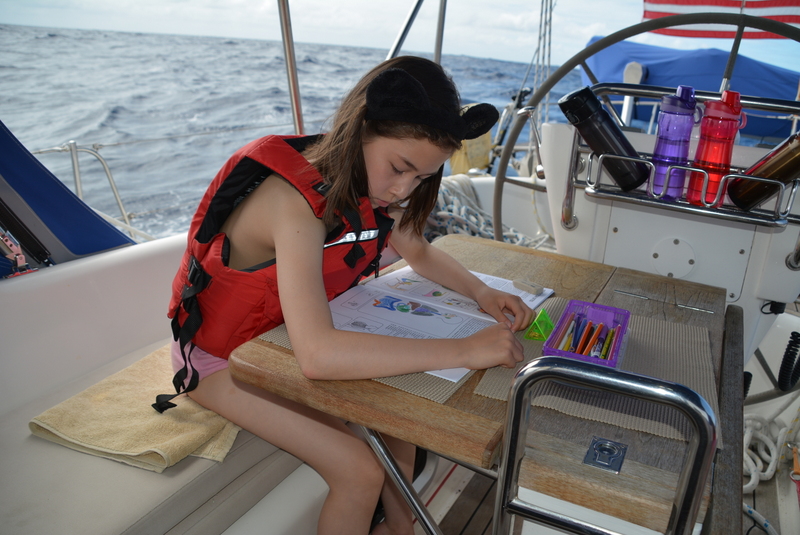
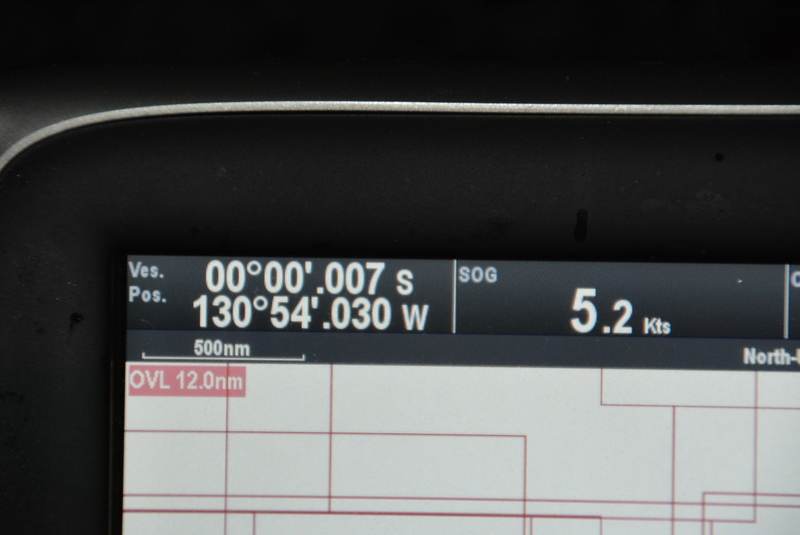
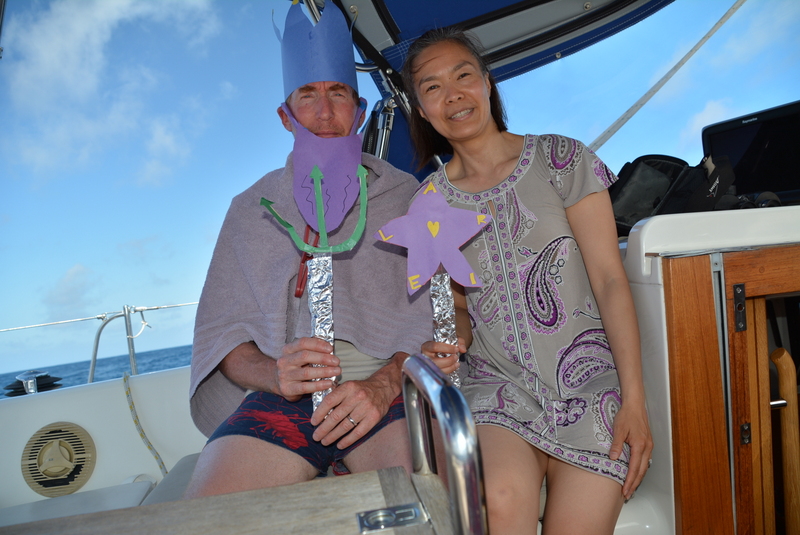
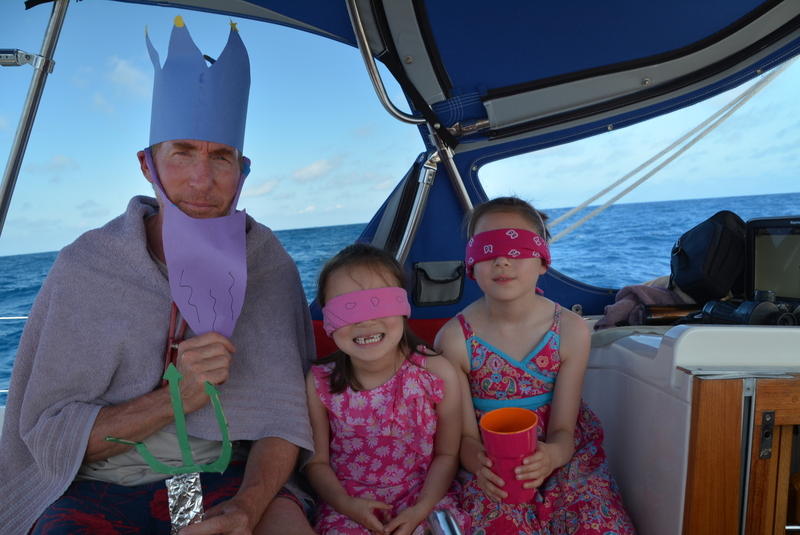
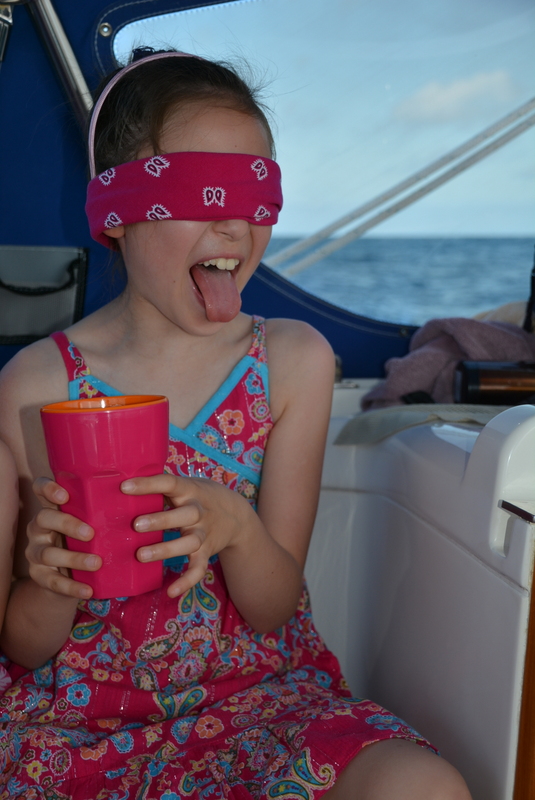
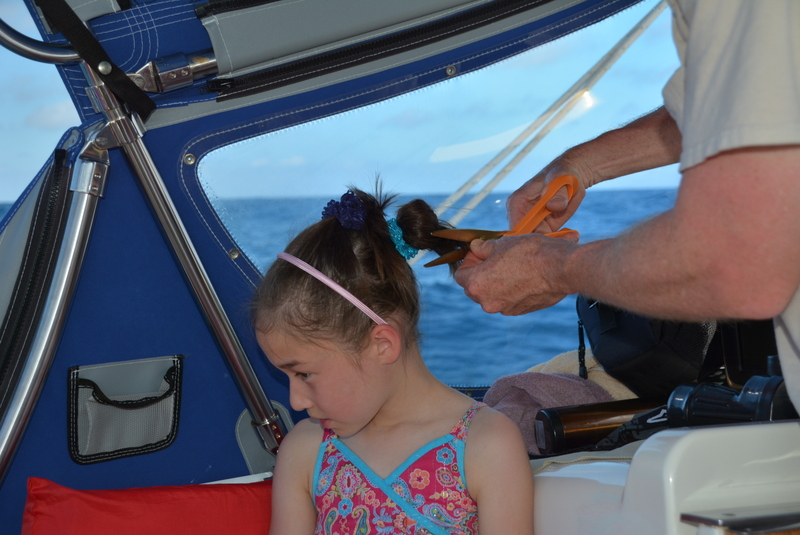
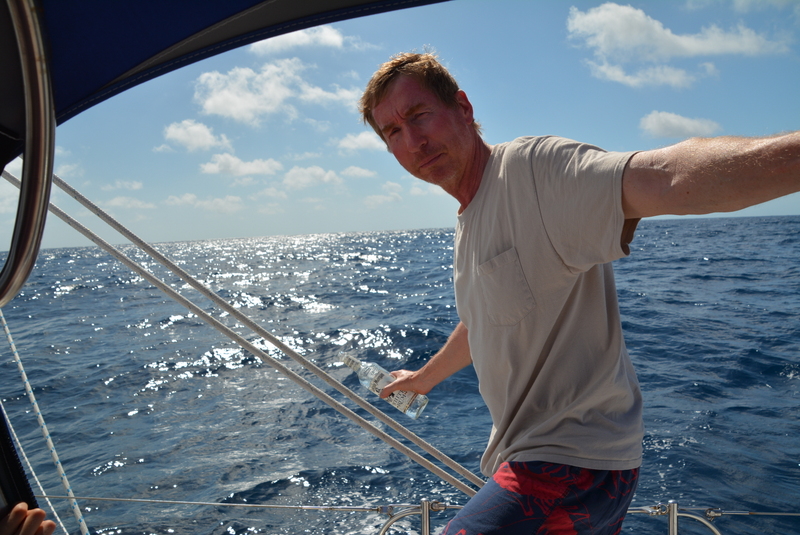
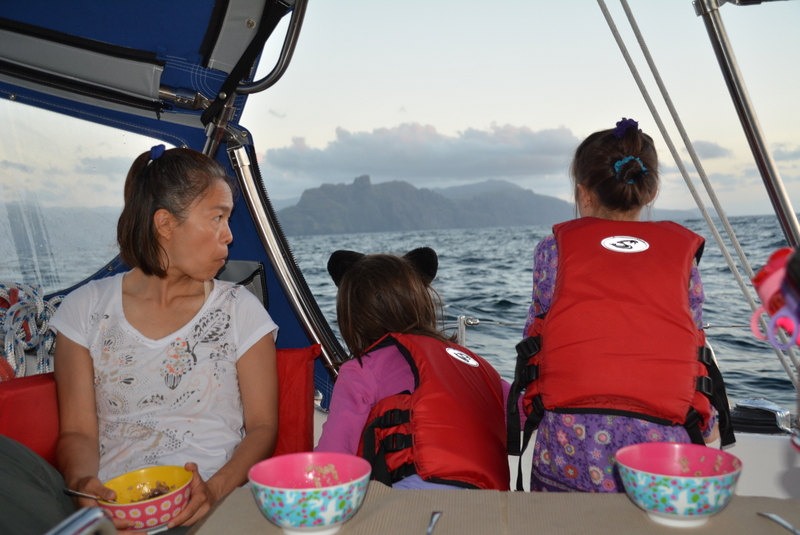
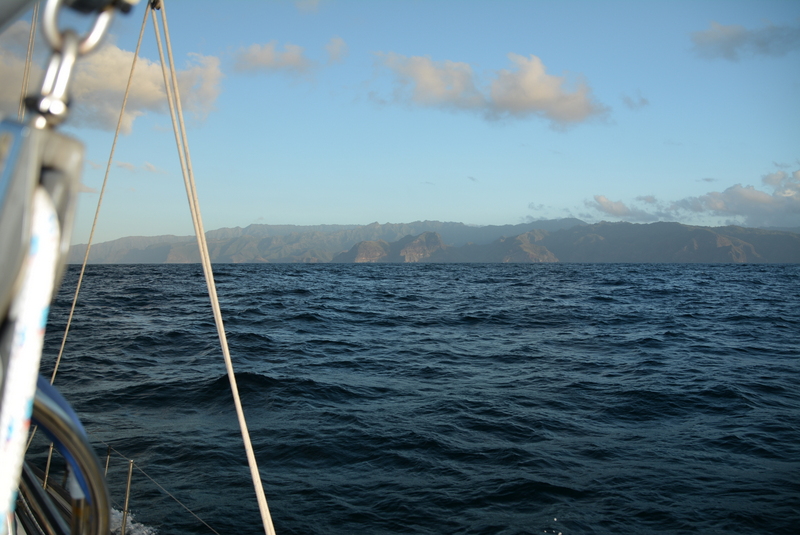
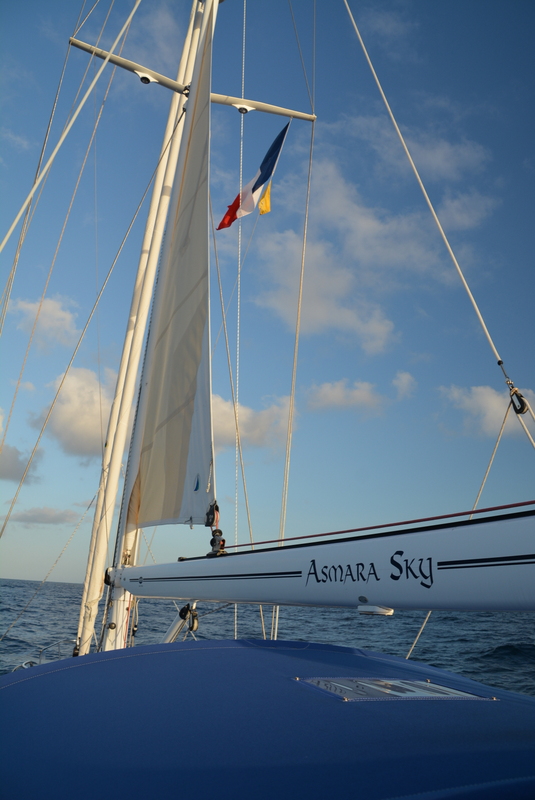
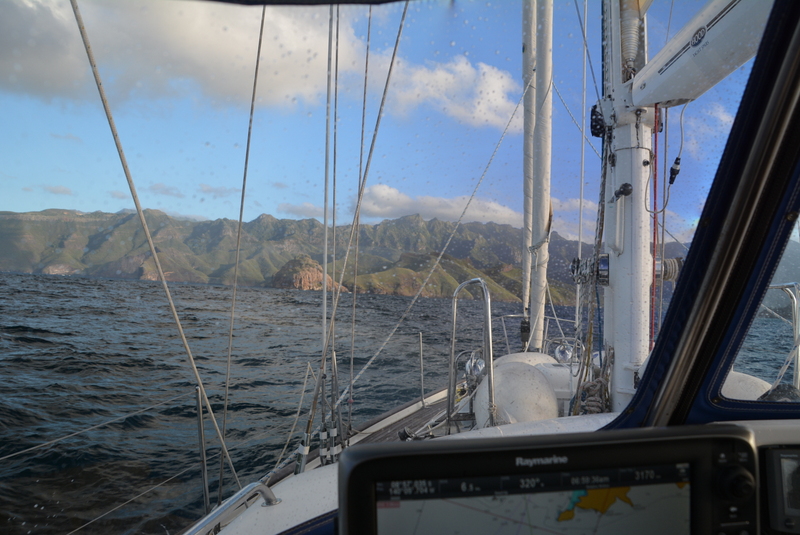

June 12, 2015
7:24 pm #comment-1
Great photos and it looks like you guys are having a blast! Thanks for staying in touch.
I don’t know if you received Julie’s email, but it looks like two other families in your cul-de-sac are moving. I appreciate them driving the price of all of our homes with their homes.
I also decided NOT to get intimidated by all the roof replacement around our neighborhood. I was thinking, my roof is not even 15 years old!! These Cedar roofs should at least last 20 years! So I got some maintenance done and decided to safe myself $50,000 this year. I never would have guessed a roof replacement is cost of a new BMW. Geezus.
Otherwise, we are enjoying a streak of beautiful weather here. Seahawks will hit training camp in a month or so and the kids are ready for their summer vacation.
We miss you guys. Be safe and keep having fun!
Curt
June 22, 2015
9:40 am #comment-2
Well done and welcome to the South Pacific. I will have a cold beer waiting for you when you get to Australia.
Safe and pleasant sailing
Terry and Elaine
Virgos Child
July 1, 2015
11:10 pm #comment-3
Thanks! We are now in Huahine and loving it. Looking forward to Oz.
Cheers.
Derek